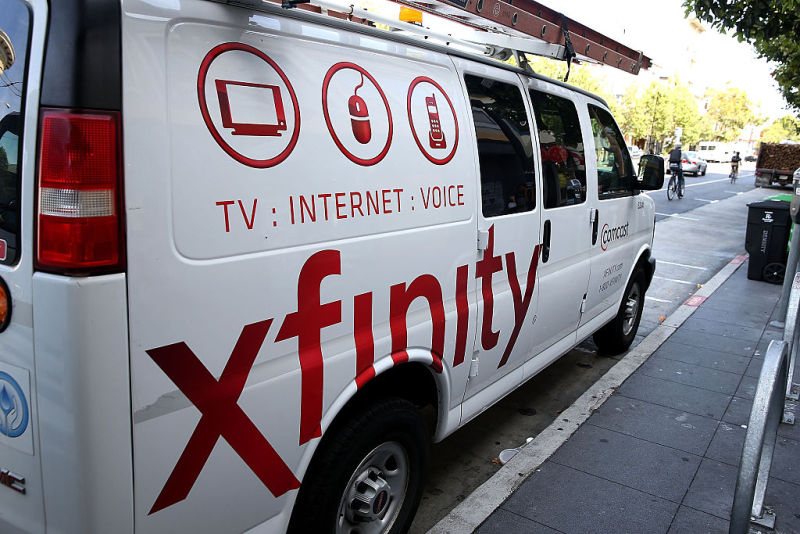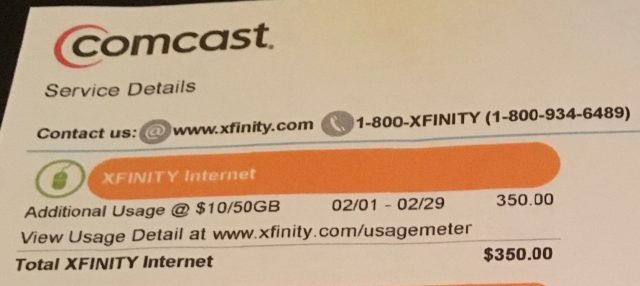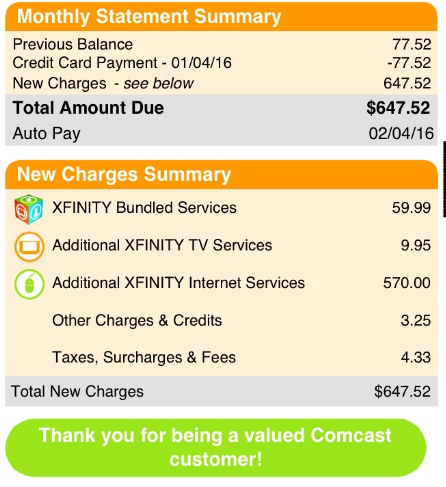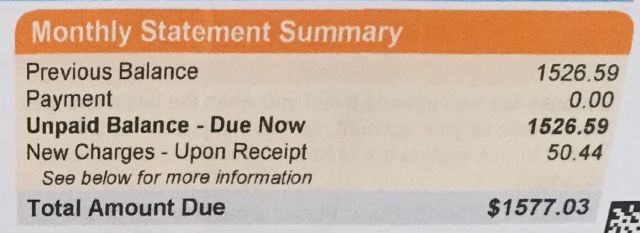
On March 18, Ars received an exasperated e-mail from the father of one very frustrated Comcast customer.
Elliot told us that his son, Brad, had received bills totaling more than $1,500, and Comcast alleged that Brad had been consistently using far more than his 300GB monthly limit. Overage charges of $10 for each additional 50GB were piling up as Comcast's meter claimed usage totaling multiple terabytes a month. In February, there were $350 worth of charges for 1,750GB of usage above the 300GB limit (about 2TB total). In January, there had been $570 in extra charges for 2,850GB above the 300GB limit (about 3TB total).
No one had any idea why Comcast's data meter was producing such high readings, but the cable company wasn't budging on the amount owed. Brad and his girlfriend, Alison, each 23 and living in Nashville, were working long hours and not using the Internet enough to consume terabytes per month, they say. Making just enough money to cover rent and college loans, they canceled their Comcast Internet to prevent more overage charges, and disputed the amount owed.
In his initial contact, Elliot told us:
So far, despite all the calls we have made, no one is willing to even provide us with one shred of proof this data was consumed, by what method or website(s) it was used on. They just keep telling us to trust them, the data was used. We have asked for investigations of the Internet history to prove this usage, and they say they will do so, but they never do.
We have had many conversations about this case with Brad, his father, and a Comcast spokesperson over the past few months. Though Elliot lives elsewhere, his name was added to the account to help sort out the billing problem. (Brad asked us not to publish his last name.)
Shortly after Elliot e-mailed us, Comcast had bill collection agents contact Brad. They were only called off after Ars relayed a message from Brad's father to the Comcast media relations department, which in turn told the company's employees to halt the collections process. Comcast also waived all of Brad's charges, but hasn't admitted any fault in its data usage measuring system.
Many other customers of Comcast and other ISPs also haven't been able to get problems addressed properly without alerting the media. Brad is merely one of several Comcast customers who has contacted us after facing similar data cap problems. In all cases, Comcast's first response is to tell customers that its meter is accurate and should not be questioned.
"We know that our meter is right... with our meter, we give you a guarantee that it is perfect," one Comcast customer service representative insisted to another subscriber who disputed data charges a few months ago. That subscriber, Chris from Georgia, had been measuring Internet usage on his own router and found big discrepancies between his own measurements and Comcast's. We'll have more on Chris and other customers later in this article. First, let's tell Brad's story.
A shocking bill
Brad and Alison signed up for Comcast in August 2015. The high data readings began shortly thereafter, exhausting the three "courtesy" months Comcast provides before charging overage fees. (Comcast recently lowered the number of courtesy months to two.) In June of this year, Comcast began offering Nashville consumers the option to buy unlimited data for an extra $50 a month, but that choice wasn't available when the company accused Brad and Alison of going over their data cap.
Brad couldn't figure out why Comcast's meter said they were using so much data, and a few more months of high readings and overage fees followed. Brad is a full-time computer technician who is also going to school, and Alison is a nurse. It's not uncommon for them to watch a few hours of Netflix after work. But they don't work at home, don't run any servers, and don't do much gaming, he said.
"I mean, realistically, I'm sure it is in the couple hundreds of gigabytes," Brad said, "but it's not near a terabyte."
Netflix high-definition video can consume up to 3GB per hour. At that rate, you'd have to watch for more than 33 hours every day to hit the 3TB Brad and Alison supposedly used in a single month. (Note: there are 24 hours in a standard Earth day.)



Getting answers from Comcast was anything but easy, as Elliot told us:
We have tried to reason with everyone we have been able to speak with that it is just not possible for these two kids to be using this much data. They would have to be downloading some massive files 24/7 for this to be possible. No one will listen to reason or offer to help in any way.
Brad estimated that he, Alison, and his father had talked to Comcast about 20 times combined, all without success. One time, Brad was on the phone with Comcast about a notification that he'd reached 90 percent of the data allotment only five days into the month. Minutes later, while talking to a Comcast employee, "I got a message saying I reached 115 percent of my usage," he said.
Comcast did some basic troubleshooting to make sure no one was stealing Brad's Wi-Fi access and that there was no malware causing the problem. Nothing nefarious was found in these quick investigations, and the MAC address on Brad's modem matched the one in Comcast's system.
Shortly after Ars first spoke to Brad, we sent some questions to our contacts at Comcast. We were still waiting for answers when, at 5pm on Friday, April 1, Elliot told us that the account had been sent to collections. "The bill collectors have been in touch already" by phone and mail, he said. We then e-mailed the Comcast spokesperson who was handling the case, and the rep had a quick reply: "That should not have happened."
Within an hour, Comcast called Brad and waived all the charges.
At this point, the case seemed to have been resolved in much the same way as an earlier case Ars had written about in December 2015. In that instance, a customer discovered a flaw in Comcast's data cap meter, and the company eventually admitted that it had recorded his MAC address incorrectly, causing the high readings.But in some ways, this is where our latest story really begins. With all charges against Brad waived, we were getting ready to write an article about this situation in April—but then, a Comcast spokesperson told Ars the company wasn't admitting any fault in its data meter. Comcast had checked the data and found that it was all accurate.
We challenged Comcast to prove its meter accurately measured Brad's usage. This set off a months-long process that began with Comcast asking Brad to test all of the Internet-connected devices in his home. Ultimately, Comcast decided that Brad's Apple TV was at fault, but the company provided no data to back up its assertion. Brad even sent his Apple TV to Apple for further testing, and Apple confirmed to Ars that the device was working properly.
reader comments
226